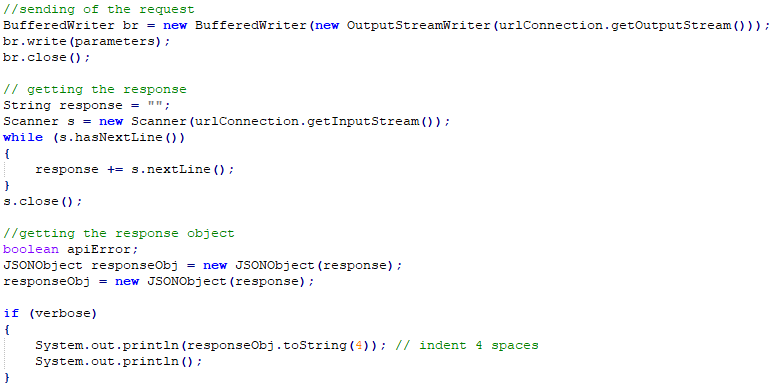Remove Beneficiary
We will first import the "java.io", "java.util", "java.net" and "org.json" packages.

Next, we create a public class "RemoveBeneficiary".
Inside the public class, we will create a public static void, and declare all the input and output variables.

Then we create a try clause, and create both the header and content object.

Then, we will connect to the API serviceName, build the request parameters, send the request, and get the response object.



Then we will parse the Content, ServiceResponse, and ServiceRespHeader, and store the "GlobalErrorID", "ErrorText" and "ErrorDetails" in "globalErrorID", "errorText" and "errorDetails" respectively.

If the globalErrorID is '010041', it means that the OTP provided has expired. We will then display the errorText and errorDetails as well as a message 'OTP has expired, new OTP will be sent'.
If it is not '010000', we will display the ErrorText and the ErrorDetails.
Else, it means that there is no error, and we will display the result.

Entire Code:
import java.io.*;
import java.util.*;
import java.net.*;
import org.json.*;
public class RemoveBeneficiary
{
public static void main(String args[])
{
boolean verbose = true;
//api url
String apiServiceUrl = "http://tbankonline.com/SMUtBank_API/Gateway";
//response parameters
String serviceRespTag = "Remove_Direct_Debit_Authorization_ReadResponse";
String globalErrorID;
String errorText;
String errorDetails;
String serviceName = "removeBeneficiary";
String userID = "bobsmith1";
String PIN = "123456";
String OTP = "123456";
String AccountID = "1111";
try
{
//building of the header
JSONObject jo = new JSONObject();
jo.put("serviceName", serviceName);
jo.put("userID", userID);
jo.put("PIN", PIN);
jo.put("OTP", OTP);
JSONObject headerObj = new JSONObject();
headerObj.put("Header", jo);
String header = headerObj.toString();
//building of the content
jo = new JSONObject();
jo.put("AccountID", AccountID);
JSONObject contentObj = new JSONObject();
contentObj.put("Content", jo);
String content = contentObj.toString();
//Connect to the API Service
HttpURLConnection urlConnection = (HttpURLConnection) new URL(apiServiceUrl).openConnection();
urlConnection.setDoOutput(true);
urlConnection.setRequestMethod("POST");
//build request parameters
String parameters = "Header=" +header+ "&" + "Content=" +content;
//sending of the request
BufferedWriter br = new BufferedWriter(new OutputStreamWriter(urlConnection.getOutputStream()));
br.write(parameters);
br.close();
// getting the response
String response = "";
Scanner s = new Scanner(urlConnection.getInputStream());
while (s.hasNextLine())
{
response += s.nextLine();
}
s.close();
//getting the response object
boolean apiError;
JSONObject responseObj = new JSONObject(response);
responseObj = new JSONObject(response);
if (verbose)
{
System.out.println(responseObj.toString(4)); // indent 4 spaces
System.out.println();
}
//parsing of content
contentObj = responseObj.getJSONObject("Content");
//parsing the service Response
JSONObject serviceRespObj = contentObj.getJSONObject("ServiceResponse");
// parsing the service response header
JSONObject serviceRespHeaderObj = serviceRespObj.getJSONObject("ServiceRespHeader");
globalErrorID = serviceRespHeaderObj.getString("GlobalErrorID");
errorText = serviceRespHeaderObj.getString("ErrorText");
errorDetails = serviceRespHeaderObj.getString("ErrorDetails");
if(globalErrorID.equals("010041"))
{
System.out.println(errorText);
System.out.println(errorDetails);
System.out.println("OTP expired, new OTP will be sent");
}
else if(!globalErrorID.equals("010000"))
{
System.out.println(errorText);
System.out.println(errorDetails);
}
else
{
return;
}
}
catch (Exception e)
{
e.printStackTrace(System.out);
}
}
}
Created with the Personal Edition of HelpNDoc: Benefits of a Help Authoring Tool